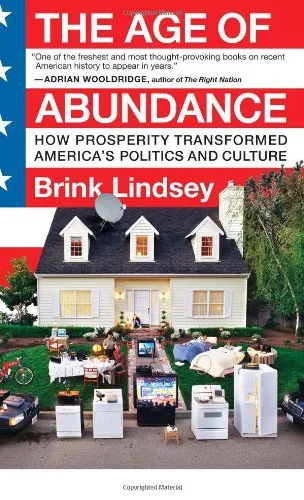The Age of Abundance: How Prosperity Transformed America's Politics and Culture
4.0
Reviews from our users

You Can Ask your questions from this book's AI after Login
Each download or ask from book AI costs 2 points. To earn more free points, please visit the Points Guide Page and complete some valuable actions.Introduction to "The Age of Abundance: How Prosperity Transformed America's Politics and Culture"
In "The Age of Abundance: How Prosperity Transformed America's Politics and Culture," Brink Lindsey unfolds a sweeping and nuanced narrative about the profound impact of post-World War II economic prosperity on America's political ideologies, social institutions, and cultural practices. This book analyzes how newfound wealth and unprecedented material comforts reshaped the collective consciousness of the United States, driving social change, ideological conflict, and ultimately transforming the country's identity.
By delving into the evolution of America's "culture wars," Lindsey examines the interplay between economic abundance and societal values. He argues that America’s unrivaled post-war affluence did much more than boost standards of living. It profoundly influenced prevailing perspectives surrounding morality, self-expression, religious faith, freedom, and equality. Employing a mix of historical narrative, cultural analysis, and economic insights, the book offers readers an engaging lens through which to understand modern America's complexities.
Below, we provide a detailed breakdown of the key themes and an exploration of why "The Age of Abundance" remains an essential read for grasping the roots of contemporary cultural and political dynamics.
Detailed Summary of the Book
The central theme of "The Age of Abundance" is that the unprecedented wealth generated in America after World War II ushered in profound cultural transformations. Brink Lindsey chronicles this economic boom and traces its cascading consequences on traditional social norms and political ideologies.
In the decades following the war, industrial advancements and a commitment to free markets resulted in wide-scale affluence that lifted millions of Americans into the middle class. With poverty rates declining drastically, average citizens gained access to leisure, education, and consumer goods on an unimaginable scale. However, Lindsey argues, this material success precipitated both liberating and destabilizing effects.
The book explores the countercultural revolutions of the 1960s, the rise of individualism, and the clashes between traditionalists and progressives. Through these stories, Lindsey unveils how prosperity dissolved long-standing certainties, encouraged new forms of self-expression, and sparked ideological polarization. From the sexual revolution to the civil rights movement and the eventual emergence of political conservatism as a reaction to social liberalization, the narrative showcases how abundance reshaped politics and culture in America.
The latter part of the book examines the long-term consequences of this ideological and cultural evolution. Lindsey insightfully explains how the currents of individual freedom and moral pluralism have defined the modern political spectrum. The book closes with reflections on ongoing tensions within American democracy and the need to reconcile conflicting values in post-affluence America.
Key Takeaways
- Economic prosperity can fundamentally transform cultural norms and political ideologies.
- Post-war affluence led to greater individualism, self-expression, and challenges to traditional authority.
- The culture wars in America are a direct consequence of the moral pluralism that affluence enabled.
- Conflicts between traditionalists and progressives reflect deeper struggles between stability and freedom, order and change.
- Reconciliation of competing values in a prosperous society remains a key political challenge.
Famous Quotes from the Book
"Affluence didn’t just make things better. It made things different."
"The contradictions of freedom, when stretched past their breaking point, give rise to constant conflict: one generation’s liberation becomes the next generation’s tradition."
"Prosperity freed the human imagination, but freedom also unleashed struggles over whose visions of the good life should prevail."
Why This Book Matters
"The Age of Abundance" is an indispensable book for understanding the roots of modern America’s cultural and political divisions. It provides a richly textured exploration of how economics, culture, and ideology intersect and shape one another. Brink Lindsey builds a compelling case for viewing postwar prosperity not merely as a phase of increased wealth, but as a transformative force that redefined society’s moral and existential underpinnings.
For students of history, politics, economics, or cultural studies, the insights from "The Age of Abundance" offer fresh perspectives for grappling with questions about stability versus freedom, tradition versus progress, and unity versus diversity. At a time when debates about the meaning of freedom and equality are more contentious than ever, this book’s lessons are timely and relevant.
By unpacking the stories behind America’s ideological divides, Lindsey’s work encourages readers to better understand, and perhaps reconcile, the values that animate modern life. Informed, balanced, and comprehensive, "The Age of Abundance" is a book that continues to resonate deeply in today's socio-political landscape.
Free Direct Download
You Can Download this book after Login
Accessing books through legal platforms and public libraries not only supports the rights of authors and publishers but also contributes to the sustainability of reading culture. Before downloading, please take a moment to consider these options.
Find this book on other platforms:
WorldCat helps you find books in libraries worldwide.
See ratings, reviews, and discussions on Goodreads.
Find and buy rare or used books on AbeBooks.
1251
بازدید4.0
امتیاز50
نظر98%
رضایتReviews:
4.0
Based on 0 users review
"کیفیت چاپ عالی بود، خیلی راضیام"


